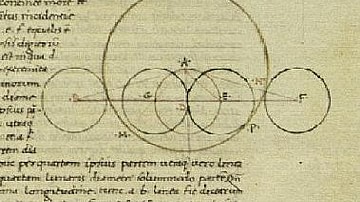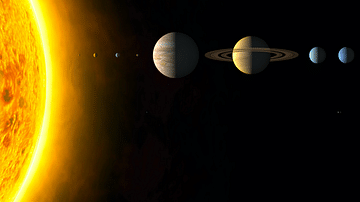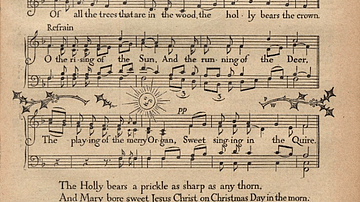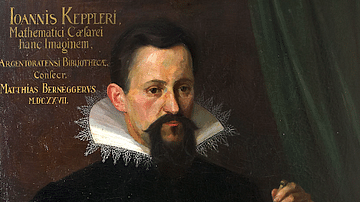Search
Search Results

Article
Jesuit Influence on Post-medieval Chinese Astronomy
Ancient China had seen little Western contact before the 16th century CE, the language, culture and science all being allowed to develop independently of foreign influence. By the time European Jesuit missionaries arrived in the 16th century...

Definition
Greek Astronomy
Ancient Greek astronomy was the study of the universe to understand how it functioned and why apart from the established theistic model that claimed all things were ordered and maintained by the gods. Ancient Greek astronomers relied on observation...

Article
Astronomy in the Scientific Revolution
The astronomers of the Scientific Revolution rejected long-held theories of ancient thinkers like Claudius Ptolemy and Aristotle and instead set out to systematically observe the heavens in order to create a model of the universe that fit...

Image
The Holly & the Ivy Sheet Music
A page of sheet music for the Christmas carol The Holly and the Ivy. From a 1926 issue of the Radio Times magazine.

Image
Sankore Mosque, Timbuktu
The Sankore Mosque, Timbuktu, Mali. The mosque, made from pounded earth and wood, was built in the late 1100s CE.

Image
Great Enclosure Tower, Great Zimbabwe
The conical tower of the Great Enclosure of Great Zimbabwe, Zimbabwe. Built in the 13-14th century CE using granite, the purpose of the structure is not known.

Definition
Johannes Kepler
Johannes Kepler (1571-1630) was a German astronomer and mathematician most famous for creating what was up to that point the most accurate model of planetary astronomy with his three laws of planetary motion. Kepler was the first to present...

Definition
Hellenistic Astrology
Hellenistic astrology encompassed various forms of divination in Greece and the Mediterranean, all linked to the observation of astronomical phenomena. Hellenistic astrology was based on the belief that the stars and planets could either...

Definition
Hipparchus of Nicea
Hipparchus of Nicea (l. c. 190 - c. 120 BCE) was a Greek astronomer, geographer, and mathematician regarded as the greatest astronomer of antiquity and one of the greatest of all time. He is best known for his discovery of the precession...

Definition
Tycho Brahe
Tycho Brahe (1546-1601) was a Danish nobleman who made the most significant contribution to our knowledge of astronomy before the telescope arrived. He discovered a supernova, observed the elliptical interplanetary orbit of a comet, updated...